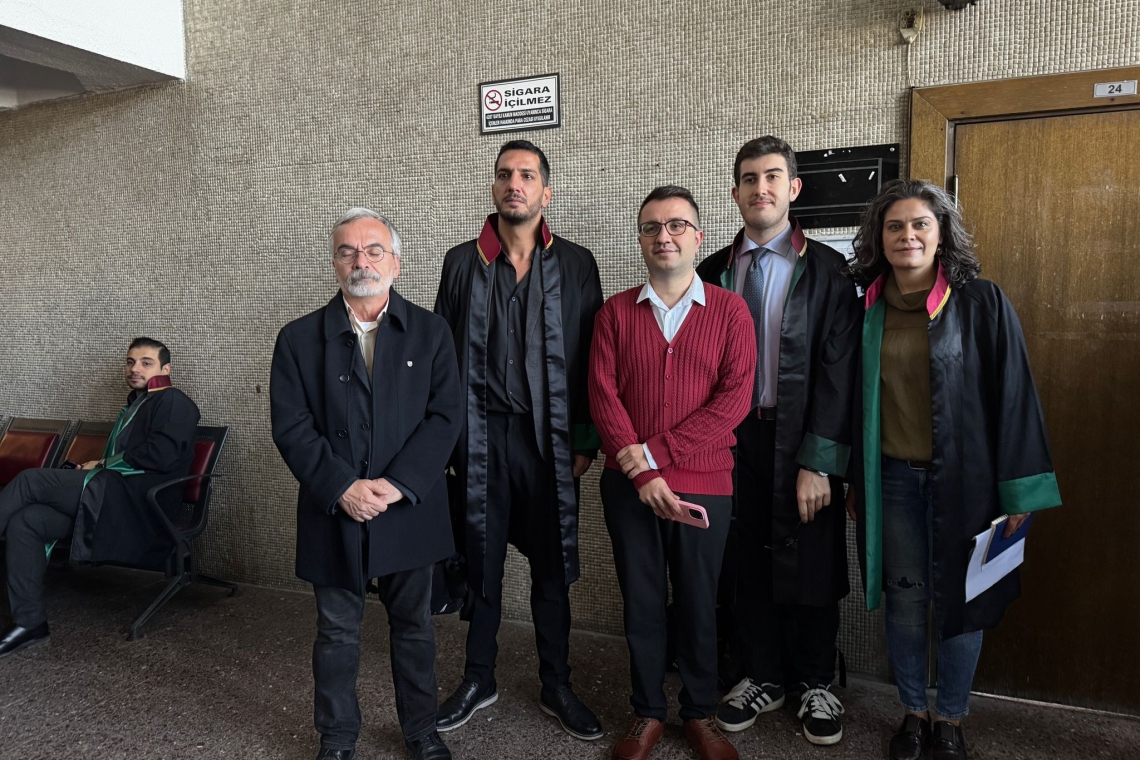Büşra Genel
A High Criminal Court in Turkey’s capital, Ankara, ruled on Monday to uphold a travel ban against journalist Yıldız Tar, who is facing charges of “membership in a terrorist organization” as part of an ongoing investigation into the Peoples’ Democratic Congress (HDK). The court, however, lifted a separate judicial control measure requiring Tar to regularly sign in with authorities.
The first hearing in the case was held at the Ankara 21st High Criminal Court after being delayed for about an hour due to the courtroom being changed twice. Yıldız Tar is being defended by the Media and Law Studies Association (MLSA), whose Co-Director Veysel Ok and legal team member Batıkan Erkoç attended the hearing. Co-defendant İbrahim Halit Elçi was also present in court.
The hearing drew wide international and domestic attention, with observers from the embassies or diplomatic missions of Sweden, France, the United Kingdom, Norway, and the European Union Delegation to Turkey in attendance. Representatives from Turkish labor union DİSK Basın-İş, LGBTQ+ rights groups such as ÜniKuir and 17 Mayıs Human Rights School, the Ankara Bar Association’s LGBTQ+ Commission, the Human Rights Association (İHD), GALADER, and MLSA also monitored the session. Turkish MP Ahmet Şık and rights advocate Özgül Saki were present in the courtroom.
Tar defends journalism and LGBTQ+ advocacy
Beginning her defense statement by identifying herself as a journalist, Tar said, “I have produced countless news reports, interviews, and radio and TV programs to tell the stories of those who cannot make their voices heard in society. Chief among these are LGBTQ+ individuals.” She went on to reject the terrorism allegations: “I am accused of membership in a terrorist organization. The only organizations I am a member of are various LGBTQ+ associations and professional journalism organizations like the Contemporary Journalists Association and the Journalists’ Association. I am not even a member of any legal political party—because journalism requires neutrality, even if one has political views.”
Defense: Evidence based on destroyed wiretaps
In his defense statement, MLSA Co-Director Veysel Ok sharply criticized the indictment. “We were disappointed when we saw the indictment. It was accepted in violation of legal standards,” he said, pointing out that the file relied on outdated and irrelevant materials. “There’s not a single element in the file about HDK. Court rulings from seven years ago have been copied and pasted into this indictment. And the Court of Cassation has ruled that HDK is not a terrorist organization.”
Ok highlighted that phone records cited as evidence date back to 2014 and had already been officially destroyed. “You are using wiretap records that no longer exist. There are no original documents in the file. A trial cannot be held without original evidence. There should be an immediate acquittal. If Yıldız had denied the recordings were hers, you wouldn’t even be able to get an expert report to verify them,” Ok said. He called for an immediate end to judicial control measures and a full acquittal, stating, “From the very beginning, this case has been marred by legal irregularities. The prosecutor who prepared this indictment should be investigated.”
“Journalists’ materials must be protected like lawyers’”
MLSA lawyer Batıkan Erkoç also emphasized that Tar, as a journalist, has the right to protect her sources. “Journalists’ materials are protected by source confidentiality, just like the materials of lawyers,” he said. “Her laptop and phone were confiscated, but no criminal evidence was found in any of her digital data. Judicial control measures must be based on strong, concrete evidence. The only alleged evidence here is the destroyed phone records, which cannot be used. If I asked for the recordings to be played, there are none.”
Erkoç added that numerous rulings—both domestic and international—have deemed judicial control measures on journalists and civil society workers a violation of freedom of expression. He asked for both the lifting of control measures and Tar’s acquittal.
“This is not just a criminal trial”
Attorney Hayriye Kaya, also representing Tar, stressed the broader implications of the case: “This is not just a criminal trial—it’s a case about freedom of expression, press freedom, and democratic pluralism. Yıldız Tar is a powerful symbol of solidarity for LGBTQ+ individuals who have long been targeted in Turkey. This trial is an attempt to criminalize journalism.”
In his defense statement, co-defendant Halit Elçi said, “HDK is a legitimate and democratic organization. It advocates for democracy, and I support those same values.” He noted that the indictment contains no concrete evidence linking HDK to terrorism.
When the presiding judge suggested proceeding with the trial without discussing whether HDK qualifies as a terrorist group, Veysel Ok objected: “A proper defense cannot be made without discussing that issue.” Lawyer Batıkan Erkoç added, “Only a final court ruling can designate an organization as an armed terrorist group.”
Observers blocked from re-entering courtroom
After a five-minute recess, court officials barred journalists and observers from returning to the courtroom. The court ultimately ruled to lift the signature requirement imposed on Tar but upheld her international travel ban. The next hearing is scheduled for Feb. 23 at 2:15 p.m.



